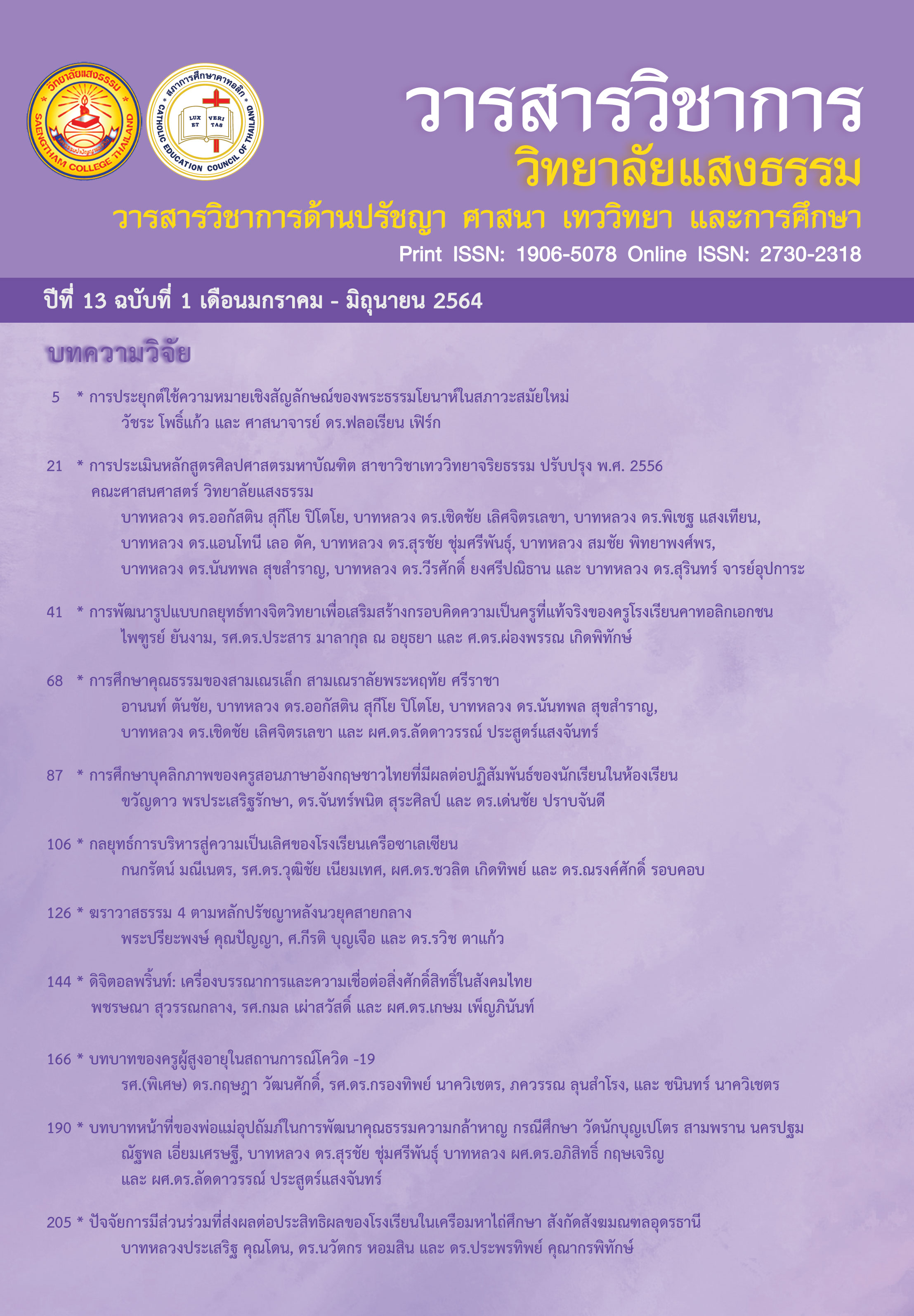A Study of Thai English Teachers Personality Influencing Students Interaction in The Classroom.
Main Article Content
Abstract
The purpose of this study aimed to investigate the personality of Thai English teachers in Surat Thani Province and its influences on students’ interaction in the classroom. This study was an explanatory sequential mixed-methods research design using quantitative and qualitative methods in a single research, from collecting quantitative data to using of the first phase results to build on to the qualitative phase. The participants in the quantitative phase were 100 Thai English teachers who taught English from Prathomsuksa 1 to Matthayomsuksa 6 in private and government schools in Surat Thani Province. The five informants in the qualitative phase were selected from the participants according to the criteria. The 44 items of the Big Five Inventory were used in the first phase of gathering data. The findings show that the Agreeableness personality is the most common personality in 44 of the 100 samples while only 3 teachers are the Openness to Experience. Moreover, an interesting outcome from the empirical evidence points to the fact that teachers' behavior which derives from their personality. At the same time, teaching has an influence on students to interact in classrooms.
Article Details
- The academic and research articles, as well as the content and opinions expressed therein, published in Saengtham College Journal are solely the responsibility of the respective author(s).
- Articles published in Saengtham College Journal are the property of Saengtham College. Reproduction, modification, or dissemination of all or part of the content in any form without written permission from Saengtham College is prohibited.
- Articles published in Saengtham College Journal are protected under the Copyright Act.
References
Borg, S. (2006). The distinctive characteristics of foreign language teachers. Language Teaching Research, 10(1), 3-31.
Cawvey, M., Hayes M., Canache D., & and Mondak, J. J. (Jan, 2017). Personality and Political Behavior. Oxford Research Encyclopedia of Politics. Doi: 10.1093/acrefore/9780190228637.013.221
Fenderson, P. R. (2011). Personality Characteristics of 2009 National Teacher of the Year Candidates. Walden University.
Hakimi, S., Hejazi, E., & Lavasani, M. G. (2011). The relationships between personality traits and students’ academic achievement. Procedia-Social and Behavioral Sciences, 29, 836-845.
Hattie, J, (2003). Teachers Make a Difference What is the research evidence? In Australian Council for Educational Research (ACER). Retrieved from http://research.acer.edu.au/cgi/viewcontent.cgi?article=1003&context=research_conference_2003
Higgins, C. (2011). Teacher-student Relationship Development: A Qualitative Study of Interpersonal Connecti0ns in an Early Childhood Classroom. (Electronic Thesis or Dissertation). Retrieved from https://etd.ohiolink.edu/
John, O. P., Donahue, E. M., & Kentle, R. L. (1991). The Big Five Inventory-Versions 4a and 54. Berkeley, CA: University of California, Berkeley, Institute of Personality and Social Research.
Jurczak, I., & Jurczak, E. (2015). Personality of the Teacher as an Important Element in the Educational Process of the Child. Pedagogika Rodziny, 5(2), 79-88.
Kanoksilapatham, B. (2016). Promoting Global English while Forging Young Northeastern Thai Learners’ Identity. 3L: Language,Linguistics, Literature®, 22(3).
Kyriakides, L., Creemers, B. P., & Antoniou, P. (2009). Teacher behavior and student outcomes: Suggestions for research on teacher training and professional development. Teaching and teacher education, 25(1), 12-23.
Lotfi, M., Muktar, S. N. B., Ologbo, A. C., & Chiemeke, K. C. (2016). The influence of the big-five personality traits dimensions on knowledge sharing behavior. Mediterranean Journal of Social Sciences, 7(1 S1), 241.
Masruddin, M. M., & Pratiwi, H. H. (2016). Students’ perception and Their Attitude Towards English Teachers’ Personality. Langkawi: Journal of The Association for Arabic and English, 2(2), 202-218.
Morgan, B., & De Bruin, K. (2010). The relationship between the big five personality traits and burnout in South African university students. South African Journal of Psychology, 40(2), 182-191.
Moussa, W. S. (2013). Essays on academic achievement and student behavior in public schools (Doctoral dissertation, Syracuse University). Retrieved from https://surface.syr.edu/
Mulyanegara, R. C., Tsarenko, Y., & Anderson, A. (2009). The Big Five and brand personality: Investigating the impact of consumer personality on preferences towards particular brand personality. Journal of Brand Management, 16(4), 234-247.
Perlman, D. J. & Pearson, P. (2012). A comparative analysis between primary and secondary teachers: A self-determination perspective. The Shield: research journal of physical education and sports science, 7, 8-17.
Rowe, Ken, (2003). The Importance of Teacher Quality As A Key Determinant of Students’ Experiences and Outcomes of Schooling. Retrieved from https://research.acer.edu.au/research_conference_2003/3
Sehgal, M. & Karu (1995). Teacher as an Agent of Mental Health: A Cross Cultural Confirmation. Proceedings of World Congress of Cultural Psychiatry, March.
Yasseen, B. M. B. (2010, February). The effect of teachers' behavior on students' behavior in the classroom. In International Forum of Teaching and Studies, 6(1). 48-57.


